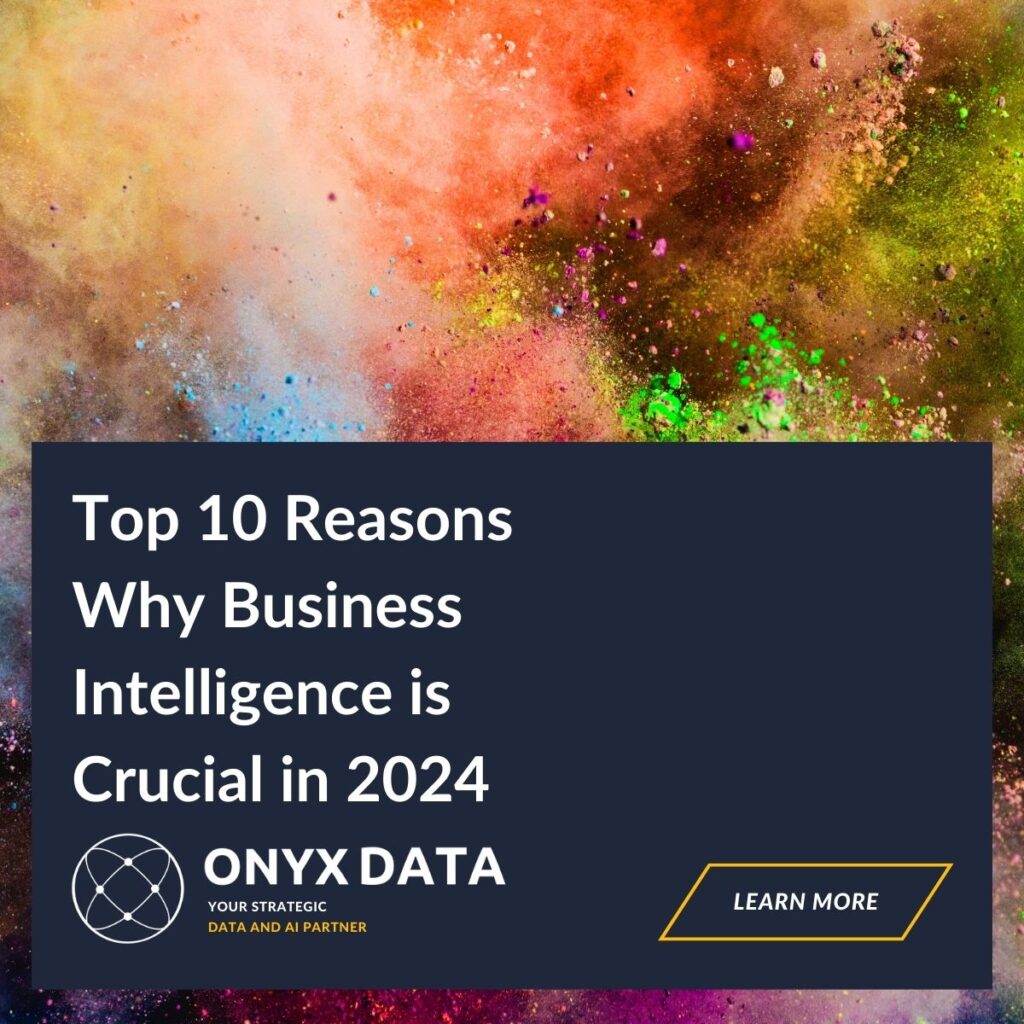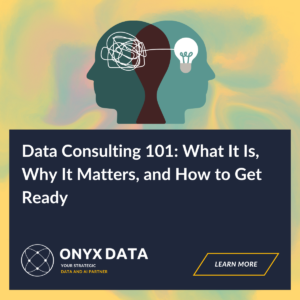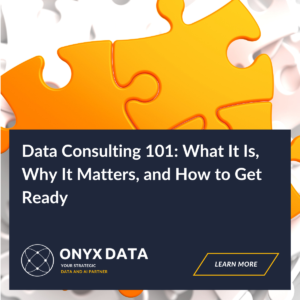Top 10 Reasons Why Business Intelligence is Crucial in 2024

Top 10 Reasons Why Business Intelligence is Crucial in 2024

In today’s digital world, integrating Business Intelligence (BI) isn’t optional; it’s essential for businesses in 2024. BI isn’t just for decision-making anymore; it’s a key to staying competitive. Let’s explore the top 10 reasons why BI is vital this year, aiding businesses to adapt, succeed, and lead with informed decisions.
Imagine data-driven insights predicting market shifts and AI-enhanced analytics revealing consumer preferences. Companies are rapidly adopting these advanced tools to improve BI, resulting in better forecasts and decision-making. Cloud solutions make accessing these insights fast and scalable, meeting modern business demands.
With BI, complex data stories become understandable for everyone, and mobile BI tools provide real-time access to data. In 2024, BI is changing the business landscape. Explore its importance and learn how these insights can drive your business towards remarkable growth.
1. Improving Decisions with Business Intelligence
In today’s market, quick, informed decisions are key. Business intelligence (BI) tools enable this by offering crucial data insights. In 2024, BI adoption is vital for filtering data and gaining actionable insights that shape business strategies effectively.
BI equips decision-makers with dashboards that spotlight trends, helping businesses forecast industry changes and adapt quickly. Companies using BI tools can spot consumer behavior patterns, tailor offerings, and enhance customer satisfaction, boosting retention.
Predictive analytics in BI goes further by using historical data to anticipate future outcomes, aiding strategic decisions. For example, fashion retailers predict seasonal trends from past sales data, refining inventory and marketing.
BI simplifies data interpretation and opens access organisation-wide. This broad data access ensures collaborative, informed decisions across departments, promoting data-driven growth.
Next up in BI’s evolution is augmented analytics—AI merging with BI for deeper insights. The following section explores how this fusion is reshaping BI, leading to smarter, automated decision-making.
2. Augmented Analytics in BI
In 2024, businesses will face an overwhelming amount of data. Augmented analytics simplifies business intelligence (BI) by using AI to automate data analysis and generate insights. This streamlines traditionally complex BI tasks. With machine learning and natural language processing, it helps organisations make quicker and more reliable decisions.
As businesses produce large amounts of data daily, augmented analytics supports real-time analysis. It suggests insights and guides users through complex questions, requiring no advanced technical skills. This democratises data access, enabling swift action and maintaining competitiveness.
Unlike traditional BI that relies on past data, augmented analytics examines structured and unstructured data, offering diverse problem-solving capabilities. In competitive sectors like finance, it helps identify trends and disruptions early. By analysing patterns, it anticipates consumer behavior, allowing personalisation of strategies.
Rapid insights become crucial as businesses strive for efficiency and strategy improvement. Augmented analytics is essential for operational advances. Amidst these changes, prioritising data governance and security is vital. Merging innovation with security ensures insights are both high-quality and securely applied.
Data Governance and Security Essentials
Data’s value in business is undeniable, making governance and security critical. As companies use data insights for strategy, robust frameworks ensure integrity is maintained.
Data governance protects sensitive information amidst rising cyber threats. Strong policies in business intelligence (BI) systems prevent breaches and safeguard reputations. Security also embodies corporate responsibility and ethical practices.
Compliance with global regulations like GDPR and CCPA is crucial. Ethical governance helps avoid fines and builds trust. Currently, 70% of companies struggle with compliance, needing improvement.
BI solutions must integrate security features like encryption and multi-factor authentication. Advanced tools identify vulnerabilities, reducing incident response times by 30% with predictive analytics.
Automated compliance tools in BI are growing, streamlining processes and freeing up resources for innovation.
Next, we’ll examine how self-service BI tools empower users to drive a data-driven culture, enhancing governance efforts.
Empowering Users with Self-Service BI
Dive into the world of self-service business intelligence (BI), crucial for extracting value from data in 2024. These tools empower everyone, from executives to frontline employees, to independently analyse and visualise data, breaking traditional silos.
Self-service BI offers intuitive tools that simplify data interaction, requiring no deep technical knowledge. It reduces dependency on IT teams for reports, freeing them for strategic tasks. As a result, companies can make faster decisions using accurate insights when needed.
Beyond speedy decisions, self-service BI cultivates data-driven thinking. Employees make choices in line with organisational goals using visualisation tools to generate insights quickly. Companies see boosts in productivity and engagement, empowering employees.
This approach fosters innovation, integrating analytics to uncover trends. It sets the stage for advanced analytics and AI, which we’ll explore further.
Onyxdata.co.uk leads with solutions that ensure seamless integration and user-friendly experiences, aligning with current market needs for business success.
5. Onyx Data’s Advanced Analytics and AI Integration
In today’s fast-paced business world, advanced analytics and AI are essential. Onyx Data leads this transformation, offering solutions that help businesses gain insights efficiently. Our cutting-edge analytics create scalable systems necessary for managing vast data volumes.
Recognising the need for precision, Onyx Data provides custom AI solutions that align data with business goals. Our tools improve data collection and predictive analysis, turning raw data into actionable insights.
AI integration in business intelligence helps anticipate trends and drive data-based decisions. It automates processes and reveals hidden patterns, fostering growth through secure data management, essential in 2024.
Onyx Data customises solutions for varied industries, enabling businesses of all sizes to leverage data for competitive advantage. Our shift to advanced managerial tools supports sophisticated data storytelling, simplifying complex insights into engaging narratives for strategic alignment.
Transformative Power of Data Storytelling in BI
Data storytelling is vital in business intelligence. It turns data insights into relatable, actionable narratives, helping decision-makers. We process over 2.5 quintillion bytes of data daily, so understanding it is essential. Storytelling links insights into a clear story that informs crucial decisions.
A major benefit is how it simplifies complex data into intuitive visuals, accessible to everyone, from analysts to non-tech staff. This approach connects the dots, spots trends, and foresees outcomes without needing special training.
Firms using narrative BI focus on clarity and relevance, achieving goals 10% more effectively, according to the Top 10 Business Intelligence Trends And Innovations in 2024. This underscores storytelling’s role in aligning actions with strategy.
Moreover, narrative BI speeds up decisions, with 23% faster timelines. Companies gain quicker insights into obstacles and opportunities, adapting swiftly to changes.
Moving to cloud-based BI, this evolution ensures data becomes accessible and scalable for agile enterprises, enhancing data storytelling reach through cloud power.
7. Shift to Cloud-Based BI Solutions
In 2024, moving to cloud-based business intelligence (BI) is crucial for staying competitive. These solutions offer flexibility, scaling effortlessly to meet market demands and enabling quick management action without disruptions from traditional updates.
Cloud BI provides real-time data access, essential for quick decisions. It breaks down information silos, boosting team collaboration with shared, up-to-date data. This improves decision-making and business performance.
By 2024, 85% of organisations will adopt cloud-first BI, showing its unmatched speed and accessibility. With growing mobile use, cloud solutions meet the need for instant analytics, keeping companies agile.
Cloud BI improves operations and meets the demand for complex analytics, supporting advanced data features. This transition paves the way for future BI enhancements, like improved data visualisation, discussed next.
8. Advanced Data Visualisation Techniques
In 2024’s data-driven world, effective visualisation is key for understanding complex data. By turning vast datasets into clear visuals, businesses gain insights quicker, enabling better decision-making. Companies leveraging visualisation can process data 60% faster than those using older methods.
Interactive dashboards are now essential, offering simplified access to complex data. Users can explore data from various angles in real-time, which aids in timely decision-making. Utilising advanced dashboards boosts analytical efficiency by 40%, allowing for faster strategic shifts.
Dashboards do more than present data. They tell stories with visuals, showcasing trends and anomalies, leading to 15% better decision-making. This visualisation fosters clearer communication across all organisation levels and aids in crafting insightful narratives.
With cloud-based BI solutions on the rise, integrating advanced visuals scales up data use. This empowers everyone, not just data scientists, supporting agile decision-making. This democratisation benefits companies as they move to responsive models.
Next, we’ll explore how mobile BI and real-time data transform these advanced visual techniques, ensuring data-driven choices can be made anytime, anywhere.
9. Mobile BI and Real-Time Data Access
In 2024’s fast-paced business world, mobile BI is a key part of business intelligence strategies. It offers real-time data access anytime, anywhere, giving decision-makers crucial agility. With 75% of businesses adopting mobile BI to boost efficiency, its importance is clear.
The main benefit of mobile BI is its ability to provide real-time access to essential insights. As companies spread out, mobile devices help leaders and staff make quick, data-driven decisions. In retail, for instance, sales teams can swiftly alter strategies based on live data to boost local performance.
Mobile BI’s on-the-go analytics aid rapid decision-making, translating complex data into simple insights. This is vital for processes like supply chain management and customer service, where timely decisions improve satisfaction and revenue.
By integrating advanced data visualisation on phones and tablets, mobile BI simplifies daily tasks. As predictive analytics merge with mobile BI, businesses will anticipate trends and enhance strategic planning.
10. Benefits of Predictive Analytics
In today’s competitive market, predictive analytics in business intelligence is vital. Using historical data, it helps businesses forecast future trends, anticipate market demands, and strategically position for growth.
Predictive analytics boosts operational efficiency by analysing past performance to identify patterns and challenges. Companies can then refine strategies in advance, optimising supply chains, managing inventories, and personalising customer experiences for enhanced satisfaction and loyalty.
Firms employing predictive analytics improve their decision-making. Retailers see up to a 15% sales increase through better demand forecasting and inventory management. In finance, predictive models reduce risks in lending and investing, stabilising portfolios.
Machine learning is at the heart of predictive analytics, refining algorithms with new data. This adaptability keeps businesses agile, ensuring they respond to changing markets quickly and capitalise on opportunities.
For businesses seeking a competitive edge, predictive analytics bridges historical data with future success, enabling proactive strategies and unlocking growth potential. In a rapidly changing market, this approach is essential.
Conclusion
In 2024, business intelligence is crucial for decision-making and building competitive strength in a fast-changing market. Augmented analytics speeds up the data-driven decisions that are now essential.
Platforms like Onyx Data lead with AI to simplify complexities, while data governance ensures trust and security. From raw data, storytelling and visualisations create engaging and informative insights.
With cloud and mobile BI, accessing real-time data helps businesses innovate swiftly. Predictive analytics offers insight into future trends, supporting strategic foresight.
As business intelligence evolves, the discussion continues. Are we truly using these transformative tools to their fullest? Let’s embrace and advance the potential of BI for a data-focused future.
About Onyx Data
Onyx Data specialises in consulting and training services tailored to harness the power of advanced data analytics and AI integration through Microsoft technologies, including Power BI and Microsoft Fabric.
By transforming complex data into insightful, actionable outcomes, we empower businesses to enhance their performance and decision-making processes, making our services indispensable for enterprises across diverse industries.
Unlock the full potential of your data with our expert consulting and training solutions. Discover more about Onyx Data today.



